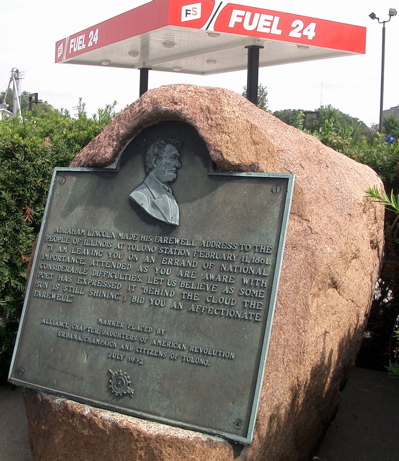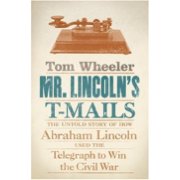
(Lincoln marker in Tolono, Illinois; September 2004)
Growing up in the adopted land of Lincoln, and growing up in the ’60s, when Civil War echoes were loud, reminders of the 16th president were everywhere — license plates, highway and street names, and parks. Oh, yeah: And log-cabin-type toys. So on his birthday, I’m thinking of all the places I’ve run into Lincoln.
1954
I’m born 145 years after Lincoln. The Lincoln connection: This is the year Illinois began printing “Land of Lincoln” on its license plates.
1960.1
During two weeks when I was out of school with first the chicken pox, then the mumps, my dad gets me a Fletcher Pratt history of the Civil War. Words like “Potomac” enter my vocabulary (pronounced “POT-o-mac”).
1960.2
Mom and Dad bundled the three of us kids (me and sibling costars John and Chris; my sister Ann joined the cast in ’62) into our red-and-white Ford stationwagon early one Saturday evening for a sudden road trip. I think it was a Saturday, anyway. That night, we wound up in a motel in Jeffersonville, Indiana, just across the Ohio River from Louisville, where Mom’s brother Tom was serving as a Carmelite priest. We spent the next day doing north-central Kentucky sight-seeing. The two stops I remember: The Cistercian monastery at Gethsemane and Lincoln’s birthplace near Elizabethtown. The cabin in which he was said to have been born — and later, I came to the disappointing realization that the cabin is a reconstruction — was tiny and dark.
c. 1960-62.
I see Carl Sandburg’s multivolume biography, “Lincoln, the Prairie Years and the War Years,” on my parents’ bookshelf. I don’t think I ever cracked it. On the other hand, I did open “The Day Lincoln Was Shot,” by Jim Bishop. My mom liked to tell the story of how I came to her after reading the book. She said that I was crying and told her, “They killed him.” I’d love to be able to say I remember all this like it was yesterday, but I don’t recall it.
c. 1962-63
Another semi-literary encounter with Lincoln: Another book that wound up in my hands thanks to my parents was a sort of abridged kid’s editions of notable American Heritage magazine articles. The book’s long lost now, but it seems like I spent years poring over it. It had stories about a colonial siege of a French fort, the naval exploits of Oliver Hazard Perry and James Lawrence (the latter credited with coining the phrase “don’t give up the ship), a star-crossed early Navy ship called the USS Constellation, the country’s first oil boom (Titusville, Pennsylvania), and the art of Gilded Age valentines. The book also had a piece on how when the Lincoln Memorial opened, the lighting on the statue of Lincoln was all wrong and had to be fixed (an unabridged, pictureless version of the article is online: “Light for Lincoln’s Statue“).
1970
Lincolnian Nixon: In the midst of the antiwar upheaval, right after Nixon had sent U.S. forces into Cambodia and four students had been killed by National Guard troops at Kent State University in Ohio, a big march was called in Washington. Very early the morning of the demonstration, Nixon went out to the Lincoln Memorial, where many protesters had already gathered. Getting out among the people — it was a positively Lincolnian gesture when viewed from an era in which the president systematically excludes critics from his audiences. (A second Nixon/Lincoln Memorial memory: Ask me and maybe I’ll tell you about the time I dreamed I assassinated Nixon on the steps of the memorial. Really.)
1971
My dad and my brother Chris and I drove out to Gettysburg (John was sick with pneumonia and I guess Ann didn’t come because it was a guy trip or something. I’m sure she’ll set me straight). History will little note nor long remember my visit, unlike Lincoln’s in 1863.
1973
On a whim, I hitchhiked to Washington to see the Watergate hearings. It was tough getting rides and I wound up taking a long detour to Watkins Glen, New York, where The Band, Allman Brothers and Grateful Dead were playing a one-day concert at the racetrack there. I eventually made it to Washington, but without enough money to get a motel room anywhere. I wound up at the Lincoln Memorial after dark — the first time I’d ever been there. I was so tired from the trip that I sat down, leaning against one of the columns outside, and fell asleep. It was a very warm night, and eventually I stirred myself, strolled out toward the Washington Monument, found a spot that seemed inconspicuous, and went to sleep. I got into the hearings the next day. Richard Helms, the former director of the CIA, was testifying. Dick Cavett was in the audience, wearing a blue workshirt and a kerchief around his neck.
1988
During a family visit to New Jersey, my brother John and I rented a car and with my older son Eamon (who was going on 9) took the Garden State Parkway down to Cape May, where we got on the ferry to Lewes, Delaware. We decided to drive into Washington along U.S. 50, from the east. The day had been blistering, and it didn’t cool down much after dark. We got a room at the first motel we saw, the Day’s Inn on New York Avenue, as I recall, and then went out to explore a little. We made it to Georgetown, called our Illinois friends the McCrohons about 10 o’clock, and went over to their place, on Connecticut a few blocks above DuPont Circle. We got to talking, the natural state of affairs, and didn’t leave until about 2. Eamon was asleep in the back seat, so John and I decided we should do a little more landmark reconnoitering. We wound up down at the Lincoln Memorial around 3. I’m having a hard time believing I did this — maybe we took turns getting out of the car or something, or maybe I trusted that since we were parked nearby it would be OK to leave Eamon in the car — but we spent half an hour or so at the Vietnam Memorial. We spent the next day in Washington with the McCrohons. The following day, we returned to New Jersey by way of a sweeping detour to Harper’s Ferry, West Virginia, and the Antietam battlefield. Antietam: Lincoln went there, too, to try to prod his commanding general into action (he wound up having to fire him).
2004
I went back to Illinois in September 2004 to take a driving trip with my dad. We weighed a couple long road trips — out to western Kansas on two lane roads, for instance — and settled on a trip down to the southern tip of Illinois. Headed down Interstate 57, we rolled through Champaign and then saw a sign for Tolono, a place I wanted to see because an old Utah Phillips railroad song carries the name of the town. Our first improbable sighting after deparing the interstate: an inline skater in the oncoming lane, wearing shorts and a backpack but no shirt. The second was in town: A historical marker commemorating Lincoln’s stop at the railroad junction there on February 11, 1861, as he headed east for his inauguration. The marker, on the grounds of a gas station, reported that Lincoln made his last speech in Illinois in Tolono (reporters on the train with him said he made “remarks” in Danville, a little further east, as well as at the Indiana-Illinois border). Dad and I drove on south to Cairo and a little beyond, then doubled back north along the Mississippi, crossing the river several times on car ferries. On the way back to Chicago after stopping to see Mother Jones’s grave in Mount Olive, we got off the highway in Springfield to see the important public buildings there. Then we found our way to the cemetery in a pleasant, leafy neighborhood north of downtown where Lincoln is buried. The tomb is heroic in scale and much more martial than I expected with statues of Union soldiers in a variety of vigllant, fighting poses. We left as the sun started to set and drove back to Chicago in the dark.
Like this:
Like Loading...


